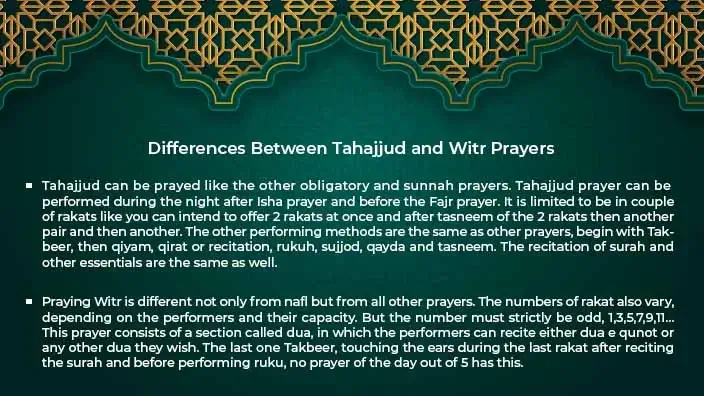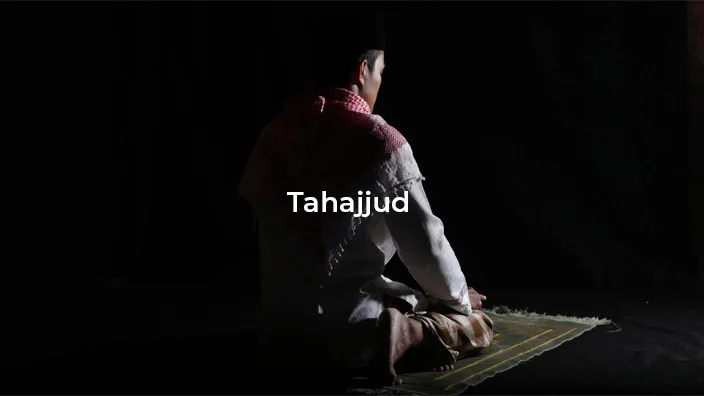Offering prayer (Namaz) is the first and foremost duty of every Muslim, without which one cannot be considered a perfect Muslim. Muslims offer prayer five times a day, one can neither offer a prayer in the time of another prayer nor all the prayers on one time. However, every prayer has its own specific time and missing prayer in that time can be offered later.
Tahajjud, the nafl prayer, voluntary or optional prayer is offered during late night or near to the dawn. The study is about how to pray Tahajjud, Tahajjud prayer dua, Tahajjud rakats, praying Tahajjud without sleeping, niyat for Tahajjud, best time to pray Tahajjud and countless more helpful information.
Table of Contents
- Meaning Of “Tahajjud” Prayer
- What Is Tahajjud Prayer?
- Tahajjud Prayer: Nafl Or Sunnah?
- History of Tahajjud Prayer
- The Importance of Tahajjud Prayer
- Scriptural Passages about Prophet Muhammad (PBUH)'S Observance of the Tahajjud
- Difference between Qiyam Al-Layl and Tahajjud Prayer
- Differences between Tahajjud Prayer and Other Prayers
- How to Pray Tahajjud and Witr?
- Tahajjud Prayer of the Prophet Muhammad (PBUH)
- Different Islamic School Of Thoughts about Praying Tahajjud
- Tahajjud Can Be Prayed Collectively or Individually?
- Rakats in Tahajjud Prayer
- Method of Praying Tahajjud
- Benefits of Praying Tahajjud
- Conclusion
- Frequently Asked Questions
Meaning Of “Tahajjud” Prayer
As Tahajjud is the late night prayer, its name symbolizes itself, the term Tahajjud is Arabic word which means to stay awake at night or to abandon your sleep. Tahajjud is only offered in between the Isha, the last prayer of the day and the Fajr, the very first prayer of the day.
Related Reading: Hot to pray maghrib
You have to make arrangements to awake from sleep at the night or to stay awake before sleep to offer this additional nafl prayer. On account of this sacrifice and then getting ready for the prayer at night while others are sleeping, this prayer is highly rewarded and is of inevitable importance. The verses of Quran are as follows:-

What Is Tahajjud Prayer?
As mentioned earlier that it is the prayer which is not obligatory but an essential, additional, highly rewarded which is termed as nafl. Offering Tahajjud is the way of attaining countless rewards from ALLAH and missing Tahhajud is not considered to be a sin and you are not blameworthy. The term Tahajjud is Arabic word which means to stay awake at night or to abandon your sleep. It is prayed by our Holy Prophet Muhammad (PBUH) and He never missed it. So Tahajjud prayer is nafl and can be prayed during the whole night between the Isha and Fajr prayer.
“Stand at night (for prayer) except a little - half of it, or a little less, or make it a little more; and recite the Qur'an (properly) in a measured way”. (Surah Al-Muzammil, 73:2-4)
Tahajjud Prayer: Nafl Or Sunnah?
Nafl means voluntary, optional and an additional, is the way of attaining countless rewards from ALLAH and missing it is not considered to be a sin and you are not blameworthy. On the other hand, Sunnah means the practice of our holy Prophet PBUH. Following sunnah is also mandatory for every Muslims.

There are two types of sunnah prayer, the one prayed by Prophet PBUH regularly is Muakkadah and the one prayed occasionally is ghair Muakkadah. So Tahajjud is neither among the five obligatory prayers not among the sunnah prayers. It is nafl, voluntary and an additional prayer, Muslims is given choice if they wish to perform they will get rewards and missing it is not a burden on them.
History of Tahajjud Prayer
The history of Tahajjud is dated back to the Prophets of Islam before the last Prophet Muhammad (PBUH), Abraham (AS) used to pray the nighttime prayers and other Prophets of Islam as well.
As the pre dated Islamic religious practice and a way of closeness to ALLAH, spirituality and piousness, the last Prophet Muhammad (PBUH) also prayed this nighttime prayer followed by His companions. Then it was named Tahajjud and was considered optional and voluntary. Though optional it is mentioned in Quran and hadith and is of high importance, he who offers Tahajjud is rewarded more than the expectations.
The Importance of Tahajjud Prayer
The importance of the Tahajjud prayer is highlighted by its history, performers and rewards. It is prayed by the Prophets of Islam and our last Prophet Muhammad (PBUH) used to offer it regularly and the followed by His companions. For this prayer Prophet PBUH used to wake up from sleep and offer this after sleep. For this prayer, we are given option of rakat, time between Isha and Fajr prayer.
In this prayer during night Muslims can make wishes of forgiveness and of paradise. So it is regarded as the source of blessings, spirituality, piousness, repentance, success in this life and after life and the love of ALLAH and His Prophet (PBUH). Its importance is emphasized in numerous verses of Quran and hadiths. “And from [part of] the night, pray with it as additional [worship] for you; it is expected that your Lord will resurrect you to a praised station.” (Quran, 17:79)
“And they who pass the night prostrating themselves before their Lord and standing.” (Quran, 25:64)

“The Lord descends every night to the lowest heaven when one-third of the night remains and says: ‘Who will call upon Me, that I may answer Him? Who will ask of Me, that I may give him? Who will seek My forgiveness that I may forgive him?’” (Bukhari, Muslim)
Scriptural Passages about Prophet Muhammad (PBUH)'S Observance of the Tahajjud
Hazrat Muhammad (PBUH) used to offer the Tahajjud prayer during the nighttime and particularly during the third part of the night which is near to the Fajr prayer. He (PBUH) never missed this prayer, He (PBUH) used to recite the lengthy surah and offer the lengthy Sujood. The observance of Tahajjud by our last Prophet Muhammad (PBUH) is highlighted in countless hadiths.
As narrated by Hazrat a`Isha (r.a): “ALLAH’s apostle used to offer eleven rakat and that was his prayer. He used to prolong the prostration to such an extent that one could recite fifty verses (of the Quran) before he would lift his head. He used to pray two rakat (sunna) before the fajr prayer and then used to lie down on his right side till the call-maker came and informed him about the prayer.” (Bukhari).
Difference between Qiyam Al-Layl and Tahajjud Prayer
The difference between both the terms is indicated by their names and is crystal clear. The Qiyam Al Layl is Arabic word which means stay at night, it can be staying for any religious worship like reciting Quran, remembering ALLAH (ZIKR), praying any missed prayer and the even can be for short interval of time.
While is arabic word which means to stay awake at night or to abandon your sleep. Tahajjud is only offered in between the isha, the last prayer of the day and the fajr, the very first prayer of the day. So Tahajjud is the special term for nighttime prayer comprised of rakats range from 2 to 10, 12 up to so on.
Differences between Tahajjud Prayer and Other Prayers
There is not much difference between both prayers; the major difference is that of performing time. All other prayers including Jumma Prayer have the same methods of praying. And for all of them the time and limit is specific, one can offer neither a prayer in the time of another prayer nor all the prayers on one time.
Every prayer has very limited and short interval of offering time. Tahajjud prayer can be performed during the night after Isha prayer and before the Fajr prayer. It is limited to be in couple of rakats like you can intend to offer 2 rakats at once and after tasneem of the 2 rakats then another pair and then another.
The other performing methods are the same as other prayers, begin with Takbeer, then qiyam, qirat or recitation, rukuh, sujjod, qayda and tasneem. The recitation of surah and other essentials are the same as well.
How to Pray Tahajjud and Witr?

Tahajjud Prayer of the Prophet Muhammad (PBUH)
Our Holly prophet (PBUH) never missed the Tahajjud prayer, He (PBUH) considered as His routine prayer. He used to wake up rom sleep during the night and after doing Uddu start a lengthy prayer reciting the lengthy surah. He used to pray Tahajjud at home and then wait for the caller of Fajr prayer.

There are four major schools of thoughts; the Hanafi, the Shafi, the Maliki and the Hanbli and all of them emphasize the performance of Tahajjud. They regard it as the most loved act to ALLAH which is regularly performed by Muahhamd (PBUH). They all agree on the fact that it is nafl, voluntary prayer and is source of spiritual growth, connection with ALLAH, way of sincerity and devotion. They stressed the minimum limit of two rakat and if one wishes for more one can.
Tahajjud Can Be Prayed Collectively or Individually?
Masjid is the place for prayers and all prayers are offered collectively in abundance of people after imam. Tahajjud is the nighttime prayer and is not possible for everyone to go to masjid. Tahajjud would be better to pray at home individually. However, you can invite your family members to offer Tahajjud with you but individually.
Rakats in Tahajjud Prayer

Tahajjud can be prayed like the other obligatory and sunnah prayers. Tahajjud prayer can be performed during the night after Isha prayer and before the Fajr prayer. It is limited to be in couple of rakats like you can intend to offer 2 rakats at once and after tasneem of the 2 rakats then another pair and then another.
The other performing methods are the same as other prayers, begin with Takbeer, then qiyam, qirat or recitation, rukuh, sujjod, qayda and tasneem. The recitation of surah and other essentials are the same as well.
The detailed guides about the about how to pray Tahajjud prayer, Tahajjud prayer dua, Tahajjud rakats, praying Tahajjud without sleeping, niyat for Tahajjud and best time to pray Tahajjud are given below.
Niyat for Tahajjud
The niyyah or intention for the Tahajjud is the same as that of other prayers, it is either expressed in the mind or uttered with very low voice that can only be audible to you. The words may vary from person to person but is often recited as, to begin with the name of ALLAH I am offering this prayer of Tahajjud comprises of two rakats facing my head towards the qibla.
Remember that Tahajjud can be performed for numerous reasons so it would be better to intend the purpose particularly before starting. Your purposes may vary from some wishes to the pleasure of ALLAH. As it is regarded as the source of blessings, spirituality, piousness, repentance, success in this life and after life and the love of ALLAH and His Prophet (PBUH) so mentioning or just keeping in mind the proposes would be better. You may keep all or only one at a time.
Number of Rakats in Tahajjud Prayer
The number of rakat is not specified for the Rhajjud prayer and is flexible. The flexibility gives choice to the performers that they can offer as many rakats as they can but minimum limit is 2. However, the main thing taken into consideration is that the number of rakat of Tahajjud prayer must be even number.
Unlike Witr prayer, it is limited to be in couple of rakats like you can intend to offer 2 rakats at once and after tasneem of the 2 rakats then another pair and then another. The most appropriate way adopted by the last Prophet Muhammad (PBUH) is that of performing 8 rakat Tahajjud ending with one rakat witr.
a). First Rakat Of Tahajjud Prayer
The first rakat always begins with niyyah or intention of the namaz, followed by Takbeer, touching earlobes or just raising your hands while saying ALLAH O AKBAR, then begin with Subhana….. then Sura e Fatiha and then another surat which one you want to recite. Then perform Rukuh and then sujood. The most accepted way followed by Muhammad (PBUH) is reciting the lengthy surah like surah Al Baqra, Al Imran. After performing the essential pillars of prayer, Arkan e Namaz go to your standing position.
b). Second Rakat Of Tahajjud Prayer
The second rakat begins with standing upright after the second sajda of the first rakat. After standing upright start the second rakat with Bismillah… followed by Surah al Fatiha and then recite any surah you want. People often prefer reciting comparatively short surah (as that of the first rakat) in the second rakat. After reciting surah then follow the general method, rukuh, sujood, qiada and tasneem.
c). Repeat The Same Praying Methods For More Rakats
If you wish to perform more than rakat then follow and repeat the method mentioned for the first two rakat. Strictly speaking, repeat the same praying methods for more rakat of Thajjud. You may perform as many rakat as you can according to your capacity and the time but remember that it should be even in number. The most appropriate way adopted by the last Prophet Muhammad (PBUH) is that of performing 8 rakat Tahajjud ending with one rakat witr.
d). Essentials and Preservations before Praying Tahajjud Prayer
There are some preservations and essential to be made sure before performing any prayer. Make sure your bodies clean, if it is not always perform Uddu. Then look for the clean place as masjid is the place for prayers but Tahajjud would be better to pray at home so always prefer clean place.
Keep your cloths clean as with the dirty cloths you are not allowed to pray. Remember one thing, Tahajjud is prayed during night, so if you are praying it after awaking from the sleep and discharge or ejaculation occurs due to every reason then it is obligatory to take a bath. Taking bath for such reason is called Ghussal, which is the cleansing of the body after ejaculation or discharging or intercourse.
e). Tahajjud Prayer Dua
Dua is must with the Thajjud prayer, it is prayed during nighttime and often it is very hard to abandon sleep and stand in front of ALLAH. Sacrificing the rest, sleep and comfort of bed ALLAH promised to give more than expectations. So ALLAH descends more closer to the earth and accept the wishes of those who perform Tahajjud and spread hands in front of Him. At that very time ALLAH never reject the wishes and longings of His beloved individuals.
While praying ask for as much things as you do, ask for protection from devil, hell, betrayal, committing sins, grabbing other rights, disrespecting and abusing, theft, spying, lie, envy and anger. Wish for paradise, truthfulness, piousness, spirituality, closeness to ALLAH, respect, honesty, forgiveness, repentance, beautiful life, righteous children, pious wife and the long and healthy life of your parents.
f). Can I Pray Tahajjud At 4 Am?
Yes, you can pray Tahajjud at 4 AM if the time of Fajr prayer is not started yet. There is no restriction of time for Tahajjud and the time is very flexible for it. Tahajjud prayer can be performed during the night after Isha prayer and before the Fajr prayer. So make sure that the time you are offering Tahajjud prayer is in between Isha prayer, the last prayer and the Fajr prayer, the first prayer of the day.
g). Can I Pray Tahajjud Without Sleeping?
Yes, Sleep is not necessary for Tahajjud. As Tahajjud is the late night prayer, its name symbolizes itself, the term Tahajjud is Arabic word which means to stay awake at night or to abandon your sleep. If you cannot wake up after sleep you can perform it before sleep but the best and proffered way of praying Tahajjud is getting up from the sleep. Tahajjud prayer can be performed during the night after Isha prayer and before the Fajr prayer. So make sure that the time you are offering Tahajjud prayer is in between Isha prayer, the last prayer and the Fajr prayer, the first prayer of the day.
h). Best Time To Pray Tahajjud
Tahajjud prayer can be performed during the night after Isha prayer and before the Fajr prayer. There is no restriction of time for Tahajjud and the time is very flexible for it. However, the best and proffered way of praying Tahajjud is the last part or the third part of the night. If you cannot wake up after sleep you can perform it before sleep but the best and proffered way of praying Tahajjud is getting up from the sleep. Narrated abu huraira:
Allah's messenger (PBUH) said, "our lord, the blessed, the superior, comes every night down on the nearest heaven to us when the last third of the night remains, saying: "is there anyone to invoke me, so that i may respond to invocation? Is there anyone to ask me, so that i may grant him his request? Is there anyone seeking my forgiveness, so that i may forgive him?" Sahih al-bukhari 1145
"indeed, worship in the night is more impactful and suitable for recitation. For during the day you are over-occupied 'with worldly duties'. 'Always' remember the name of your lord, and devote yourself to him wholeheartedly. Qur'an, 73:6-8
Tahajjud is prayed during nighttime and often it is very hard to abandon sleep and stand in front of ALLAH. Sacrificing the rest, sleep and comfort of bed ALLAH promised to give more than expectations. It is a source of repentance, forgiveness of sins, shield from the devil, sources of spirituality, success of life and the afterlife, inner peace and satisfaction, happiness of ALLAh, friendship with ALLAH, closeness to ALLAH, gaining place in paradise, shield from the fire of hell, diverting problems and the upcoming difficulties and unlimited ranks.
One cannot imagine the rewards of offering Tahajjud. Make it as the routine of your life and enjoy the peace and tranquility of not only life but also of graveyard. “be vigilant in standing up [in prayer] at night, for it was the practice of the pious before you. It is a means of gaining proximity to ALLAH ta’ala, expiation for transgressions and a barrier from sins.” (tirmidhi)
Prophet (PBUH) said: “during the night there is a time when the Muslim does not ask for the good of this world and the hereafter but it will be given to him, and that happens every night.”
Conclusion
To have an overview, Tahajjud, the nafl prayer, voluntary or optional prayer is offered during late night or near to the dawn. The number of rakat and how to pray tahajjud has not specified in the categorical terms, there is also no restriction of time and the time is very flexible for it.
It is regarded as the source of blessings, spirituality, piousness, repentance, success in this life and after life and the love of ALLAH and His Prophet (PBUH). Its importance is emphasized in numerous verses of Quran and hadiths.
ALLAH descends more closely to the earth and accept the wishes of those who perform Tahajjud and spread hands in front of Him. At that very time ALLAH never reject the wishes and longings of His beloved individuals.
Frequently Asked Questions
How many rakats are in tahajjud?
The number of rakat is not specified for the Rhajjud prayer and is flexible. The flexibility gives choice to the performers that they can offer as many rakats as they can but minimum limit is 2. The most appropriate way adopted by the last Prophet Muhammad (PBUH) is that of performing 8 rakat Tahajjud ending with one rakat witr.
How do you perform tahajjud prayer?
Tahajjud can be prayed like the other obligatory and sunnah prayers. Tahajjud prayer can be performed during the night after Isha prayer and before the Fajr prayer. It is limited to be in couple of rakats like you can intend to offer 2 rakats at once and after tasneem of the 2 rakats then another pair and then another.
What is the full dua for tahajjud?
While praying ask for as much things as you do, ask for protection from devil, hell, betrayal, committing sins, grabbing other rights, disrespecting and abusing, theft, spying, lie, envy and anger. Wish for paradise, truthfulness, piousness, spirituality, closeness to ALLAH, respect, honesty, forgiveness, repentance, beautiful life, righteous children, pious wife and the long and healthy life of your parents.
What do you read in tahajjud namaz?
Begin Thajjud prayers with raising your hands while saying ALLAH O AKBAR, then recite with Subhana….. Then Sura e Fatiha and then another surat which one you want to recite. The most accepted way followed by Muhammad (PBUH) is reciting the lengthy surah like surah Al Baqra, Al Imran. After performing the essential pillars of prayer, Arkan e Namaz go to your standing position.
Which surah is about tahajjud?
Tahajjud prayer is emphasized in many surah of Quran; Al ASAR, AL DARRIYAt, AL QALAM, but AL MUZAMMIL is particularly about Thajjud, the translation of the few verses are below:- “O you wrapped in garments (Muhammad PBUH)! arise and pray throughout the night, except for a little, half of it or a little less than that, or a little more, and recite the Quran (with tartil)."
How effective is tahajjud?
Sacrificing the rest, sleep and comfort of bed ALLAH promised to give more than expectations. It is a source of repentance, forgiveness of sins, shield from the devil, sources of spirituality, success of life and the afterlife, inner peace and satisfaction, happiness of ALLAh, friendship with ALLAH, closeness to ALLAH, gaining place in paradise, shield from the fire of hell, diverting problems and the upcoming difficulties and unlimited ranks.


















